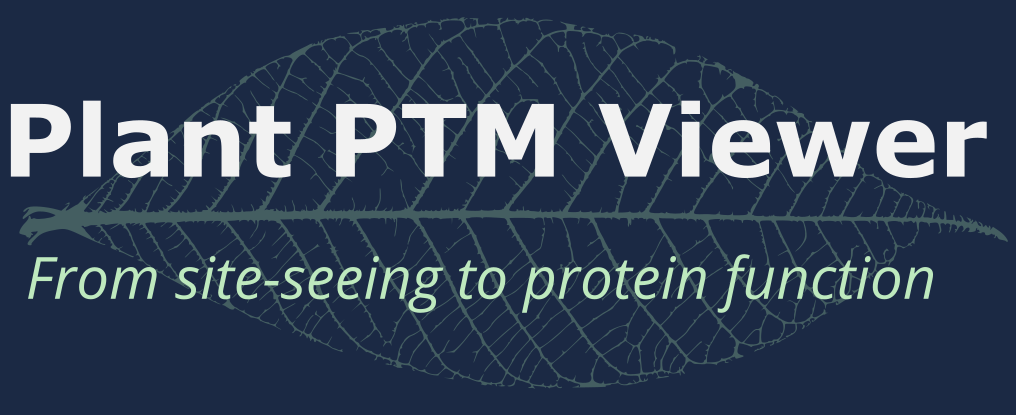

AT2G37180.1
Arabidopsis thaliana [ath]
Aquaporin-like superfamily protein
10 PTM sites : 5 PTM types
PLAZA: AT2G37180
Gene Family: HOM05D000241
Other Names: PIP2%3B3,PLASMA MEMBRANE INTRINSIC PROTEIN 2%3B3,PIP2C,PLASMA MEMBRANE INTRINSIC PROTEIN 2C; RESPONSIVE TO DESICCATION 28; RD28
Link out to other resources with this protein ID : TAIR | PeptideAtlas | ARAPORT | PhosPhAt
For each protein all PTMs are highlighted by default in the respective protein sequence (right-hand side). One can adjust a selection of PTMs in the PTM table on the left-hand side. In addition, functional protein domains and sites can be underlined if desired.
In the PTM table per PTM the PTM position and type is indicated, as well as the plain peptide sequence that was identified by mass spectrometry. The respective proteomics study is indicated by a number, providing a link to consult the experimental details. Additional PTM meta-data includes various confidence measures such as peptide score provided by search algorithms, posterior error probability (PEP), precursor mass deviation (in ppm) and modification site probability. The available confidence meta-data can be consulted in the extended PTM table by clicking SHOW CONFIDENCE. However, in the default PTM table, a color-coding of confidence is provided with green indicating high confidence, olive medium confidence, grey low confidence, and no color an unassigned confidence. More details regarding this confidence assignment can be consulted in the tutorial or the Plant PTM Viewer manuscript.
Besides confidence measures, log2 fold changes between two conditions with significance values (P- or Q-values) are shown if provided in the respective publication. Log2 fold changes are colored in heatmap-like gradient (green = induced, red = repressed) and significant values are highlighted in green. To determine significance, we employed the threshold used in the respective publication. For more details on the quantitative measurements we refer to the experimental details and respective publication, as methodologies can differ.
On the bottom of the page one can send the whole protein or a part of the protein (i.e. a functional domain) to PTM Blast. This will display aligned protein sequences that potentially report aligned PTMs.
In the PTM table per PTM the PTM position and type is indicated, as well as the plain peptide sequence that was identified by mass spectrometry. The respective proteomics study is indicated by a number, providing a link to consult the experimental details. Additional PTM meta-data includes various confidence measures such as peptide score provided by search algorithms, posterior error probability (PEP), precursor mass deviation (in ppm) and modification site probability. The available confidence meta-data can be consulted in the extended PTM table by clicking SHOW CONFIDENCE. However, in the default PTM table, a color-coding of confidence is provided with green indicating high confidence, olive medium confidence, grey low confidence, and no color an unassigned confidence. More details regarding this confidence assignment can be consulted in the tutorial or the Plant PTM Viewer manuscript.
Besides confidence measures, log2 fold changes between two conditions with significance values (P- or Q-values) are shown if provided in the respective publication. Log2 fold changes are colored in heatmap-like gradient (green = induced, red = repressed) and significant values are highlighted in green. To determine significance, we employed the threshold used in the respective publication. For more details on the quantitative measurements we refer to the experimental details and respective publication, as methodologies can differ.
On the bottom of the page one can send the whole protein or a part of the protein (i.e. a functional domain) to PTM Blast. This will display aligned protein sequences that potentially report aligned PTMs.